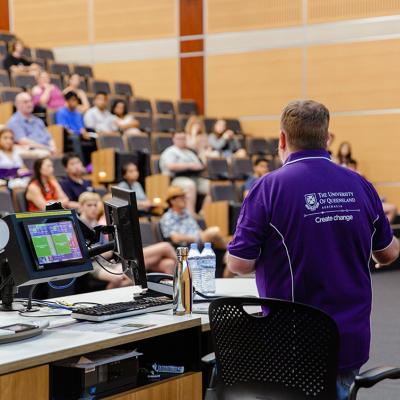You may have heard that life as a uni student is a lot more self-directed than high school.
While this is true when it comes to meeting your assessment deadlines and keeping up with your learning, it doesn’t mean you have to manage the new challenges of a more independent lifestyle on your own.
UQ’s student services team offers a range of programs and appointments that can help you manage these challenges. And being proactive about using these services to avoid burnout or a crisis ensures your time at uni is as enjoyable as possible.
It’s important to be aware of how UQ’s services can benefit you, so that you know where to go for support at any stage of your uni journey.
Emotional wellbeing
Proactively managing your emotional wellbeing ensures you maintain a manageable balance between your studies, work, and social life. All UQ students are eligible for 10 free counselling sessions per year, in which you can discuss any aspect of your life (it doesn’t have to be uni-related) in a confidential, one-to-one setting. Counselling is offered face to face, as well as via Zoom or over the phone, making it easy to take care of your emotional wellbeing in the most accessible way.
Student services also offer a range of group wellbeing programs. While some programs can help you practise mindfulness, develop confidence and overcome social anxiety, others focus on improving the quality of your relationships, and dealing with grief and loss. Things like relationship breakdowns, the death of a loved one or social anxiety can all become especially overwhelming when you also have to keep up with packed uni schedules and competing commitments. But developing strategies to manage these challenges can ensure that you still get the most out of your university experience.
Student access plans and exam adjustments
Staying up to date with class content and maintaining grades can be particularly challenging for students with a disability, medical condition, or significant caring responsibilities. Developing a student access plan by booking an appointment with a student adviser ensures that your lecturers and tutors are aware of these requirements and can help you receive an equitable learning experience. Students use these plans to ensure their classrooms are accessible, to alert their teacher of occasional class absences, and to receive extensions on assignments.
Students with injuries, disabilities or conditions can also receive adjustments to their exam arrangements. Adjustments are useful if you require additional time, need to manage fatigue, or require a scribe. Additionally, if you have certain commitments such as a specific religious observance, or you are an elite athlete, you can also be considered for alternative exam arrangements and may be able to sit your exam at a more suitable time. Getting these adjustments approved requires documentation from a doctor or specialist, but organising your exams to accommodate your needs helps to reduce stress, remain organised, and achieve the best results you can.

Study support
If the goal of going to university is to earn a qualification, then it makes sense to approach your studies with all the right tools. Academic Skills Advisers are here to help you prepare for lectures, implement feedback, and develop valuable study skills, so you get the most out of the learning materials you engage with in class. One of the key differences between completing assessments in high school and university is that drafting is rarely conducted in consultation with your lecturers and tutors. Academic Skills Advisers can discuss assessments with you to make sure you’re meeting the requirements of the task.
University study is much more self-directed than high school study. Student services also offer workshops to help you develop effective time management, reading comprehension and note-taking skills. These workshops are held at various times throughout each semester, so while it’s best to put good habits in place as early as you can, enacting a plan later in the semester might break you out of a study rut before “crunch time” (weeks 10 to 13, followed by exam block) arrives.
There are a bunch of study resources available on UQ’s website that you can utilise year-round, with videos and articles related to study skills, critical analysis, and more.
Financial assistance
A common difficulty faced by uni students is managing the living expenses that come with a more independent lifestyle. The stress associated with the cost of living can often be detrimental to students’ academic results. You can, however, apply for financial assistance to help pay for rent, utilities such as water and electricity, public transport, equipment you need for your studies, and more. As always, being proactive about getting help is the best thing you can do to make sure financial stress doesn’t get out of hand. For example, you don’t want to fail a course and have to pay to retake it because you didn’t draw upon the support available.
Additionally, there are hundreds of scholarships and bursaries available for incoming and current students, many of which are designed to help those experiencing financial hardship. It’s always worth applying for as many scholarships or bursaries as you’re eligible for each year, as scholarships can be ‘stacked’, meaning you could receive more than one.
Find out more about how UQ scholarships work and the types of scholarships you may be eligible for.

Sexual and reproductive health
Conversations about sexual and reproductive health are a normal part of young adult life. UQ offers a range of resources online that can help you develop a healthy understanding of consensual relationships, safe sex, sexuality, and where to go for support.
Your journey through university is designed to be a safe and enjoyable one. UQ Respect also offers a variety of educational materials about consent, online safety, and the role of ethical bystanders in confronting misconduct. Furthermore, all students are required to complete the Respect at UQ module in their first semester of study so we can foster a safe and respectful community at UQ.
Community-building opportunities
While it’s important to know these support services are available during your time at UQ, sometimes the most helpful thing you can do is develop a sense of belonging. UQ offers countless opportunities for students to get involved in the community. Volunteering and mentoring help boost your employability through event facilitation, build a rapport with new students, and encourage social connections on campus. It’s a great way to form relationships with your peers and develop a network of friends. Taking the initiative to involve yourself in student life can be daunting, but doing so can open many other opportunities to make an impact throughout the UQ community.
Adjusting to uni life can be challenging, but there’s a huge range of support services available to help you on your way. From academic to financial and emotional support, all you have to do is go online and book an appointment or drop into Student Central to get the advice and help you need. Your uni journey is meant to be enjoyed, and being proactive about accessing support is the best way to ensure that you get the most out of your time at UQ.
Get our top tips for a smooth transition from high school to university so you can start your first semester on the right foot.






